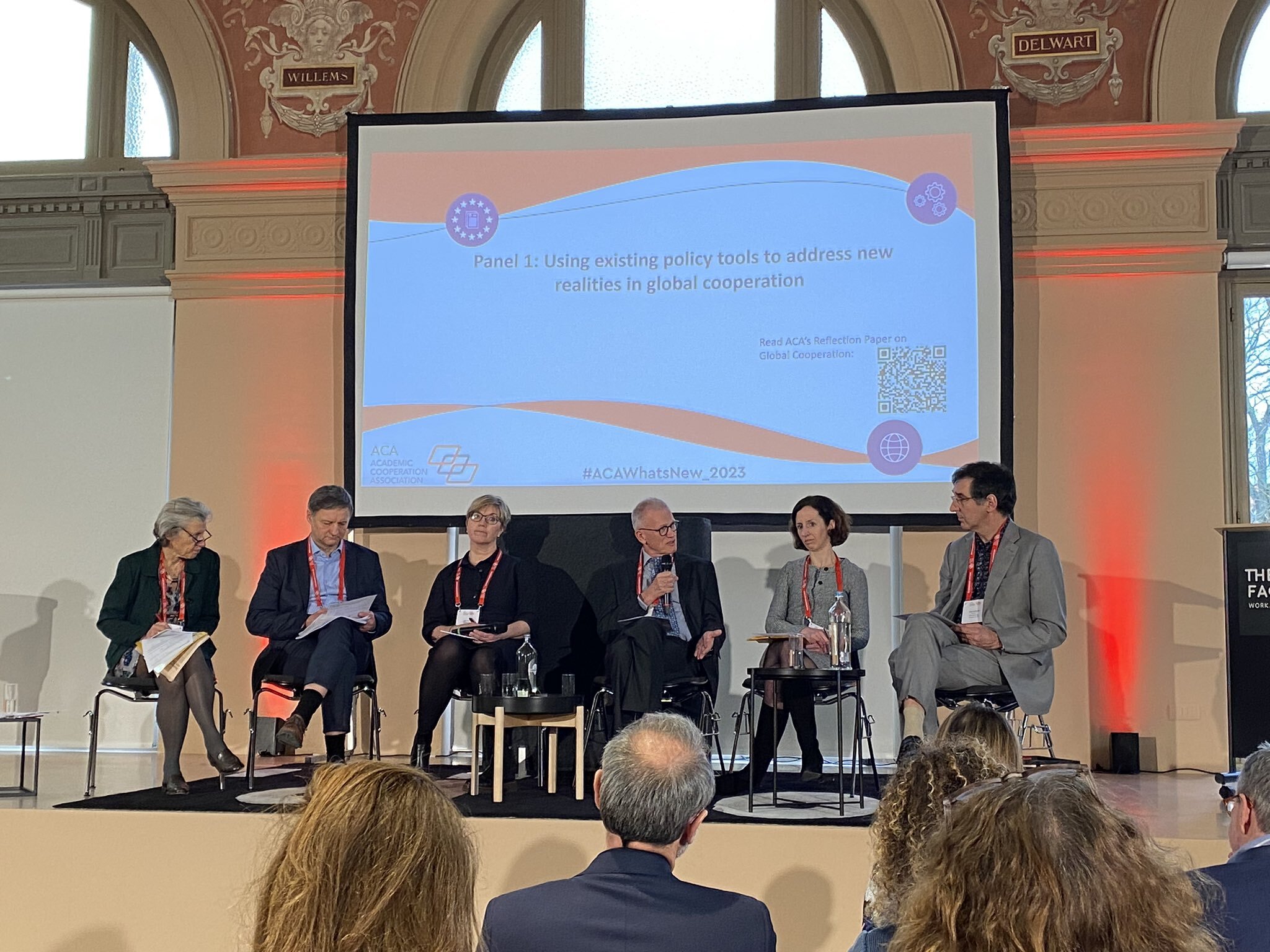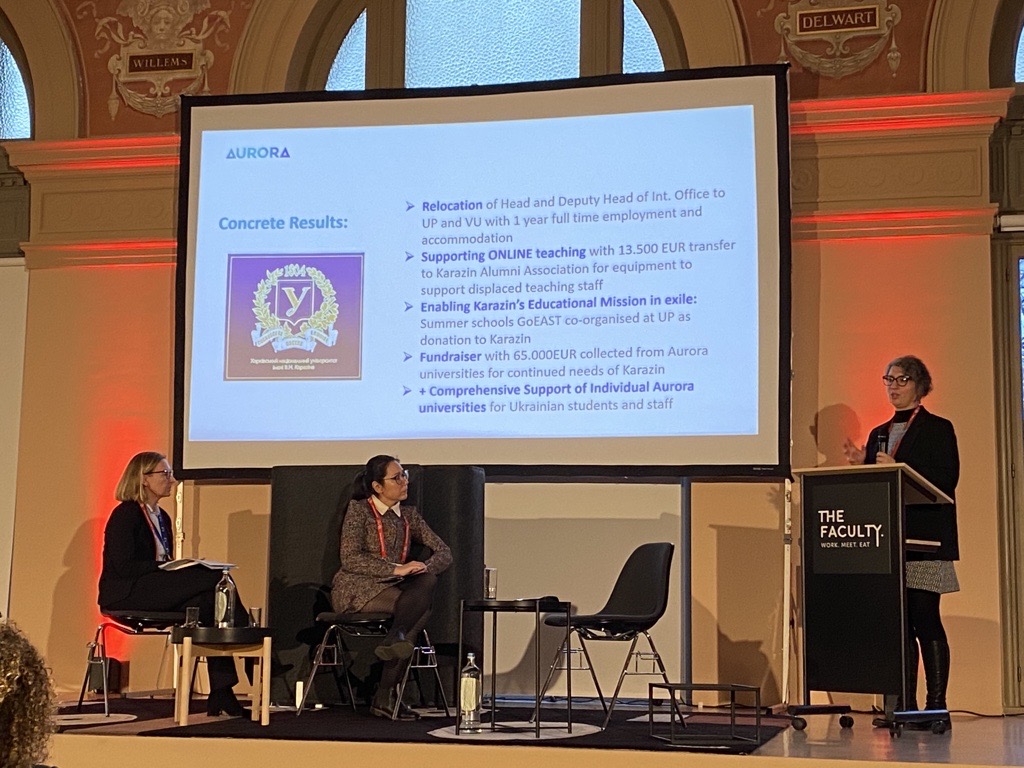What's new in Brussels? Read the main takeaways from the ACA conference
This year's edition focused on global cooperation and international education in the context of the current crisis.
On 2 and 3 February, the Academic Cooperation Association (ACA) held its annual “What's New in Brussels?” conference in Brussels. It brought together not only representatives of the Erasmus+ National Agencies, but also representatives of universities, university alliances, the European Commission, and other stakeholders active in the field of higher education (EUA, ESU, etc.). The main topic of the first day was global cooperation in education and the dilemma of openness of European universities versus security. On the second day, funding opportunities for university cooperation in the context of the current energy crisis were discussed as well as the role of European Universities' alliances.

From the left: Tania Friederichs (Senior Policy Officer, DG RTD), Filip Van Depoele (Head of Unit International Cooperation, DG EAC), Gro Tjore (Deputy Director, Norwegian Directorate for Higher Education and Skills HK-Dir), Ulrich Grothus (President, ACA), Dorina Veldhuis (Education Attaché, Dutch Permanent Representation in Brussels) a Koen Verlaeckt (Secretary General, Flemish Interuniversity Council VLIR). Photo: CZELO
An open but responsible approach to internationalisation
The main topic of the first day was the use of existing instruments, programmes, and strategic frameworks for international cooperation in a changing global context. The pandemic tested the flexibility of the European Education Area, the European Strategy for Universities and Erasmus+, while the current war in Ukraine showed that these initiatives offer not only emergency but also long-term solutions. The debate also focused on security, foreign interference, and institutional freedom. While openness is still the main feature of the European approach to global cooperation, it needs to be balanced by vigilance, which means not forgetting values, and considering possible risks.
To this end, several different instruments and national strategies have already been developed in Europe. In Germany, for example, educational and research institutions can use the services of the Competence Centre for International Scientific Cooperation (KIWi, DAAD), such as individual consultations or a comprehensive overview of potential partners, including relevant context. The Dutch government has issued guidelines (National knowledge security guidelines) to help universities cooperate more securely and prevent foreign interference. The Norwegian national agency, in cooperation with the government and the security agencies, is also preparing guidelines (Guidelines on responsibility in internationalisation) focusing on a responsible approach to internationalisation in education and research. The guidelines will also include an overview of non-EU countries from a security perspective, based on Norway's strategy for cooperation with priority partner countries (Panorama). These publications aim mainly to raise awareness among institutions of the opportunities, challenges, and risks of international cooperation and to provide them with the necessary support and advice. The panellists agreed that serious topics such as security and foreign interference require a top-down approach, but at the same time it is necessary to respect the autonomy of universities and find a balance between all parties.
Cooperation with priority regions
After the first two panels, participants learned about the current state of cooperation in the priority regions, namely the Southern Mediterranean and Sub-Saharan Africa, the Western Balkans, and the Eastern Partnership. During parallel workshops, representatives of the European Commission presented statistics on cooperation in education with each region, the number of approved Erasmus+ projects and participants discovered concrete examples through presentations of selected projects.
During the workshop on the Eastern Partnership, Selma Porobić from Palacký University in Olomouc gave a presentation on the Aurora Alliance of European Universities and its Capacity Development Support Programme (CDS) which provides support to one of its affiliated partner universities in Kharkiv. The support consisted not only of emergency plans and protection of Ukrainian colleagues, including their relocation to the Czech Republic and the Netherlands, but also a targeted fundraising campaign which managed to raise 65,000 euros within 3 months. In terms of a long-term support to Kharkiv University, between 2024 and 2028 the Aurora Alliance under the leadership of Palacký University plans to build a Karazin Peace Education Hub, which would focus on the role of higher education institutions in peacebuilding in post-conflict societies.

From the left: Kinga Bereza-Husak (Policy Officer for Eastern Partnership, DG EAC), Veronika Kupriyanova (Senior Policy Coordinator, ACA), Selma Porobic (Institutional Coordinator, AURORA Alliance, Palacký University Olomouc). Photo: CZELO
Funding in times of crisis and the importance of international networks and alliances
On the second day of the conference, there were two panel discussions. The topic of the first one was the financing of higher education institutions in the context of the current crisis. The panellists agreed that it is crucial for universities to be able to adapt to the current situation and be as flexible as possible. The crisis affects everyone, including students who have to pay for significantly more expensive accommodation as part of their Erasmus+ stays. However, the situation varies from one European country to another, as does the impact on each university and the scope of support at the national level. However, applying for funding at the European level cannot be the only solution for universities, as even here the contribution cannot be expected to cover everything that HEIs would need. It is therefore essential to communicate with each other, cooperate between all relevant institutions and be willing to compromise and adapt.
The second panel dealt with the topic of European universities and other networks and the role of inter-institutional cooperation in implementing and supporting transformation in higher education. The focus was put on collaboration and sharing of experiences and good practices within and between alliances and networks and on building resilience through international cooperation. All panellists agreed on the importance of remaining open to any relevant collaboration. Universities are very often members of more than one network and may be involved in each at different levels. For example, participation in one network may lead to deeper bilateral relationships with specific organisations or to involvement in other networks.
It is also important to explain the benefits of international cooperation not only to staff but also to students. Furthermore, the discussion emphasised that involvement in European universities and similar networks should not be the goal in itself, but rather a means to transform and bring about the necessary changes. Thus, the outputs and lessons learned from one network can be used in the activities of another network and should also be disseminated to other non-participating HEIs. Support for staff and student mobility to universities outside the current networks should not be forgotten, as it supports further networking and sharing of experiences.